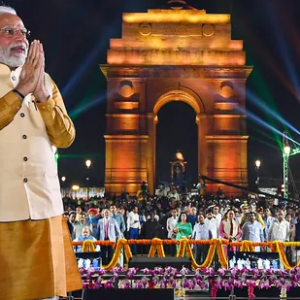For the first time in the history of Kashmir question at the UN, the Chairman of Human Rights Commission Mr. Zeid Ra’d Al Hussein of Jordan has issued a 49-page tutored report spread over 20 paragraphs on “abuse and violation of human rights” in the State of Jammu and Kashmir mainly by India and peripherally by Pakistan. The report is a forceful indictment of India, particularly her security forces operating in Kashmir.
Why has the report come today after twenty-eight years of externally sponsored Theo-fascist activities in Kashmir that consumed so many innocent lives besides the ethnic cleansing of the valley of its religious minority of the Pandits? Obviously, the report is meticulously timed to serve a specific purpose of the Chairman. This report is not to be seen in isolation. It came out at the same time when the Jordanian Chairman put the Israel resolution in the UNGA for a vote. There was no mention of Hamas in that resolution and it was approved overwhelmingly. In all probability the Chairman, who is handling sensitive matters like Israel and Kashmir almost at par and without consulting his aids intends to take a Kashmir resolution to the UNGA in the future whether or not the UNSC debates on the matter. Much is to be read between the lines.
The report picks up the thread of alleged human rights abuse from the incident of the killing of a hardcore Jaish terrorist named Burhan in July 2016 in an encounter with the security forces. He was in regular communication with Hafiz Saeed, the international terrorist designated by the UN and the US. While the report meticulously recounts civilian fatalities happened from July 2016 to March 2018, it carefully avoids the large number of attacks undertaken by the jihadists in Kashmir most of whom originated from Pakistan. Confining the report to post-2016 incident reflects two things; first is the advertent or inadvertent ignorance of the Chairman of the roots of Kashmir conflict, and the secondis his clean chit to Theo-fascists unleashing spate of violence against the civil society on the behest and support of external handlers.
This is a blatant politically motivated report aiming at raising a heap of “human rights violations” and carrying the bagful all the way to the doorsteps of India and her security forces. In doing so, the Chairman has not only shown his partisan approach to the issue but has also crossed the jurisdiction and limits of the terms of reference of his office. By directly addressing the Indian security forces operating in strife-torn Kashmirand not the government of India the Chairman has tried to undermine the sovereignty of the Indian government something incompatible with the powers, jurisdiction and authority of his office. By castigating AFSPA, the Chairman has challenged the authority of the elected government of the State of Jammu and Kashmir in taking steps for maintenance of law and order. The Chairman is ignorant of the fact that the army has been called to restore law and order in the State on the request of the State government meaning that the elected government in the State has sanctioned imposition of AFSPA owing to disturbed conditions. And who is the source of disturbance, the Chairman fails to understand or mention.
The report keeps clear of the armed attack on J&K State in October 1947, abetted and sponsored by Pakistan army; it is silent about the horrendous killings, kidnapping and rapes in Muzaffarabad and Baramulla districts in October 1947 by the invading tribesmen and their Pakistani handlers in civilian uniform.
The Commission wants an international inquiry committee to probe into the alleged abuse of human rights in Kashmir. It forgets that the first and the most glaring violator of human rights in Kashmir is the UN Security Council which deliberately politicised the Kashmir issue by bringing the aggressor and the aggressed at par to serve the interests of particular lobbies. The practice continues till date.
The report suppresses the destructive role of the Theo-fascist organizations raised by Pakistan army on its soil and purported to act clandestinely in Indian part of Kashmir and Afghanistan in line with Pakistan’s strategy of depth eastward and westward. Pakistan army never made a secret of its full involvement in Kashmir incursion of 1947 and its aftermath. The report does not say a word about the ethnic cleansing of Kashmir as early as 1990 or of five massacres of non-Muslims in Kashmir tantamount to genocide committed by the Theo-fascists coming from across the border. But it has specifically mentioned the killing of a terrorist called Burhan Wani but it has no word for large scale destruction of public property and the civilian structures in Kashmir like burning of schools, laboratories, libraries, court complexes, bridges and other infrastructure by the terrorists. The report is totally silent about the numerous terrorist training camps set up by Pakistan in PoK and elsewhere on its territory and manned by Pakistan army retired officers. It is silent about the widescale anti-India campaign launched by Pakistan jihad organizations by whipping up religious sentiments of the people and raising huge funds for Kashmir jihad. The report rakes up the 24-year old Kunan Poshpur rape charade and states that Indian security forces raped 23 women but does not make a mention of the inquiry conducted by the Indian army and the State government into the incident that absolve the security forces of all accusations. Kunan Poshpura incident is its concern but the rape and abduction of nearly five thousand Hindu and Sikh women and girls on thenight of 22 October 1947 in Muzaffarabad during the tribal attack on Kashmir is not its concern. In the eyes of the Chairman those thousands of women raped and kidnapped did not have the human rights which it thinks the alleged 23 women of Kunan Poshpora had.
In particular, the Chairman directly admonishes the Indian security forces operating in Kashmir. It is blatant abuse and misuse of its powers because he is trying to bypass the Indian government and raise an accusing finger towards the army. Who is he to tell the Indian security forces what they should do or not do? He cautions the Indian security forces of possible violence during the “following week”. Obviously, he is referring to the Eid ul Fitr festival.Does not the Chairman know that India is home to almost all major religions in the world and yet he has the cheek to talk selectively and in hyperbole?
It is a highly prejudicial report, based on motivated and mutilated information. The Chairman has stepped out of constitutional and administrative jurisdiction by issuing such a partisan report. This is gross violationof fundamental norms of impartiality of the UN in dealing with international issues of sensitive nature. Who is he to ask for an international inquiry committee to probe into Kashmir situation? Did he ever ask for an inquiry into the Baluchistan atrocities or repression in Gilgit and Baltistan? Did he ever ask for an inquiry into the massacre of Kurds by Turkish government? Did he ever ask for an inquiry into the aggressive designs of Saudi Arabia in Yemen? Did he ever ask for rape, abduction and killing of Yizidi girls in the Middle East?Did he ask for inquiry into the persecution and suppression of Pakistani religious minorities like Ahmadiyya, Christians, Hindus and now Shias for whose decimation jihadi organizations like Lashkar-i-Jhangvi and Jundullah etc. make open statements. Are not these unfortunate minorities part of humanity and don’t they enjoy human rights like any other community on the globe? Why does not the violation of their human rights touch the delicate humanitarian sense of the Chairman?
This is a highly motivated, parochial, prejudicial and offensive report of which India should take very serious notice. India should take several steps in this connection. Without a day’s delay New Delhi should lodge a very strong protest with the UN Secretary General bringing to his notice the partisan approach of the Chairman of Human Rights Commission. India should bring a motion of no confidence against the Chairman and his team and demand his immediate removal from a very sensitive position of an institution that is required to command trust of international fraternity.
Not only that, India should announce a boycott of the session of Human Rights Council and its affiliates unless the Chairman is removed. She should record her protest formally. The Chairman of the Human Rights Commission has embarked on a very dangerous course and his intentions are deeply suspect of functioning in a partisan manner. It will be a sad day for the UN if such biased and politically motivated persons head its critical subsidiaries. India should forthwith issue a condemnation statement and also threaten to bring a motion of no confidence against the chairman in the UN General Assembly. The pious institution of UN Human Rights Commission cannot be and should not be given in the hands of those who are miserably ignorant of the past and present history of along standing dispute, and especially of issues that have been hounding international community for decades at a stretch. It has to be made clear that Kashmir issue is the creation of Anglo-American bloc and is the modern avatar of mid-19th century British diplomacy called “The Great Game”. New Delhi has to remember that if it does not rise to counter the report today, it will have to face innumerable embarrassments at the United Nations in future. Its image will get tarnished for all times.
It should also be made clear to the Chairman and the entire Human Rights Commission that Kashmir issue is closely and tightly linked to the resurgence of Islamic fundamentalism and jihadist ideology that have gripped the entire globe in one way or the other. It is vital thatJihadism fought toothand nail to preserve the human rights of the population. The Chairman of the Human Rights Commission should understand that during only one month in the past, Kashmir terrorists have launched 47 attacks and hurled 20 hand-grenades on the camps of security forces. The Chairman should try to understand what role India, as the world’s largest secular democracy is playing to democratize a populace that has been brought up in closed and restricted environs of exclusiveness for centuries in the past.
(Prof. K.N. Pandita is a former Director of the Centre of Central Asian Studies, University of Kashmir)
Latest News

Bharat on the Move: A Decade of Change and Progress
April 16, 2024

Economic Reforms Since 2014
April 16, 2024
